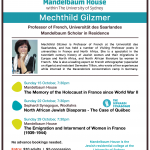Gary A. Rendsburg
The Jews of Arabia
The least known Jewish community in the ancient world is the network of Jews who populated the Arabian Peninsula during the years between the destruction of the Second Temple in 70 C.E. and the rise of Islam during the 7th century C.E. Nonetheless, a significant amount of material written in Hebrew, Aramaic, Greek, Arabic, and South Arabian – much of it discovered only within the past several decades – illuminates these Jewish communities. Jews lived in oases in northern Arabia, they lived as Jewish tribes in and around Medina, and they even formed the basis of a Jewish kingdom in Yemen – while the wealthiest among them arranged for their burials in the land of Israel, notwithstanding the great distances involved. The narrative reminds us how time and again the historian of Judaism needs to have the broadest cultural and geographical horizons.

